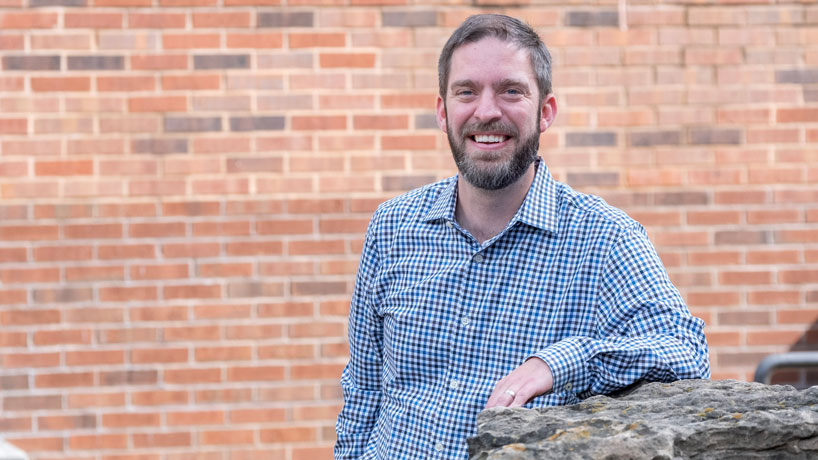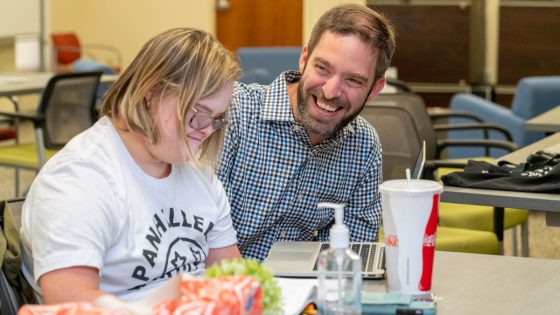
The State of the Art Conference bestowed Jonathan Lidgus, director of the Succeed Program, with the 2023 State Level Leadership Award. Each year, the State Level Leadership Award is given to an individual who reflects leadership and commitment to furthering the field of inclusive higher education. (Photos by Derik Holtmann)
Jonathan Lidgus was shocked to learn the State of the Art Conference bestowed him with the 2023 State Level Leadership Award, especially since he’s been involved with the conference for several years.
He suspects there was a bit of subterfuge involved in deciding this year’s honoree.
“It was definitely a surprise,” Lidgus said with a laugh. “I think there were some meetings where I wasn’t involved.”
While surprised, Lidgus was grateful to receive the recognition.
“I am very honored to get that award,” he said. “I have been part of a really great group here in the Succeed Program. I have been a part of a really great group at the state level in Missouri, and I have a really great group that I work with regionally in the Midwest Inclusive Postsecondary Alliance. All those groups and all those people are really working toward a mission. I’m really proud to be a part of that and help lead postsecondary education across the region and the state. It’s great.”
SOTA is an annual conference hosted by Syracuse University’s Lawrence B. Taishoff Center for Inclusive Higher Education, and it’s aimed at providing opportunities for universities, researchers, parents and program staff members to learn about the current state of inclusive postsecondary education.
Each year, the State Level Leadership Award is given to an individual who reflects significant leadership through state-level alliance building, leading efforts to enhance available funding for college students with intellectual disabilities or program development and informing state legislation or policy to further the field of inclusive higher education.
Lidgus has certainly done that as the director of the University of Missouri–St. Louis’ Succeed Program in the College of Education. This year, the trailblazing postsecondary education program is celebrating a decade providing opportunities for UMSL students with intellectual and developmental disabilities to develop academic, living and vocational skills as they work toward a two-year Chancellor’s Certificate or potentially matriculate to a degree program.
Over the past 10 years, Lidgus and his fellow Succeed team members have shepherded the program’s continued growth. It now has a dedicated, full-time staff and has expanded programming for students beyond the Chancellor’s Certificate, including the implementation of the Succeed+ and Link programs. Most recently, the College of Education established the Office of Inclusive Postsecondary Education to oversee that expanding programming. Many of those efforts were supported by a 2020 Transition and Postsecondary Programs for Students with Intellectual Disabilities grant from the U.S. Department of Education, which provided $2.1 million in federal funding to augment the program.
The success of the Succeed Program is undeniable, but Lidgus noted he has grown into his role leading it. He added that his academic and career path also began in a much different place.
Lidgus attended Augustana College in Rock Island, Illinois, as an undergraduate on the pre-med track. However, an early internship in an emergency room dashed his plans to eventually enter the medical profession.
“I was like, ‘Nope, not going to do that,’” he recalled. “That is OK, somebody else can be a doctor. That’s where I realized that was not the life for me.”
Jonathan Lidgus talks with Lucy Salamon, a 2nd year Succeed certification student, about her classwork and how the school year is going.
He continued his course of study as a biology major but decided to focus on behavior, neurology and psychology. After graduating with a bachelor’s degree in biology, he applied to counseling programs across the country.
“UMSL had probably one of the best counseling programs in the United States,” Lidgus said. “So, I applied, got in, and then I got a grant assistantship in the activities office.”
As a counseling master’s student, Lidgus worked as an RA and assistant hall director. In that role, he found a passion for student affairs and student housing.
“I felt that the best, biggest impact in higher education in student growth is in campus housing,” he said. “There are opportunities that campus housing may give you in terms of independent living – budgeting, learning who you are as an adult, getting along with people that you live with.
“I really like seeing the impact of what I do, so you can see the growth happen in student housing. That was really important, watching students grow, watching our RAs and our student leaders grow.”
Student involvement on campus and housing was the through line that led Lidgus to Succeed. After graduating with an MEd, Lidgus was hired by UMSL in what is now the Office of Student Involvement. He then moved to the Office of Residential Life and Housing, working his way up the ladder to director.
He had been leading the office for about 11 years when a group of faculty and community members came to him with the idea for a postsecondary program. He admits that he was hesitant at first. Concerns over liability clouded his vision of what the program could be.
However, Associate Professor April Regester and several members of St. Louis Arc took Lidgus on a trip to observe a similar postsecondary program at another university. That’s when things clicked and the possibilities at UMSL became apparent.
Shortly afterward, Lidgus began working with Succeed on the housing and campus life side of the program. During those initial years, there was a learning curve, especially because he had not worked closely with people with developmental and intellectual disabilities previously. He soon realized advocacy was an integral component of the job.
“I’m employed to support this population, and part of that support means you’re advocating for them as well,” Lidgus said. “You are educating others about what inclusion is.”
Lidgus accepted the position of director in the program’s fourth year. By then, it was already clear that UMSL created something special.
“I was part of the planning team, and when the program launched, we had typical bumps in the road,” he said. “But it really was in that second or third year that I realized that we had something unique, something that the campus supports. I can’t thank the campus enough for the support. That’s something that is just amazing here is the amount of administrative support and faculty support that we have. It’s really great.”
Over the past decade, the program has grown considerably in size and ambition.
“When we started, we only had two coordinators and a director,” Lidgus said. “Now we employ 11 full-time staff members. The growth in attracting top staff members, researchers and faculty that want to come to UMSL to work with our program and the growth in the student population – that signals to me that we are making correct decisions and that people are investing in us as much as we are investing in our students. It shows our growth is positive, and it’s causing a positive effect across the state and region.”
While there’s much to be proud of, Lidgus is especially fond of working with students’ families and seeing firsthand the impact Succeed is making.
“My primary work now is with the parents or family members, and you are taking the family on a journey that they never thought was possible,” he said. “When their student was born and they learned about their disability, they never thought college was an opportunity. Inherent in them attending college, it is scary, exciting, emotional. The thing I learned is that you have to meet the family where they’re at because they’re the most important people in that student’s life. Helping the family is just as impactful as helping the student.”















